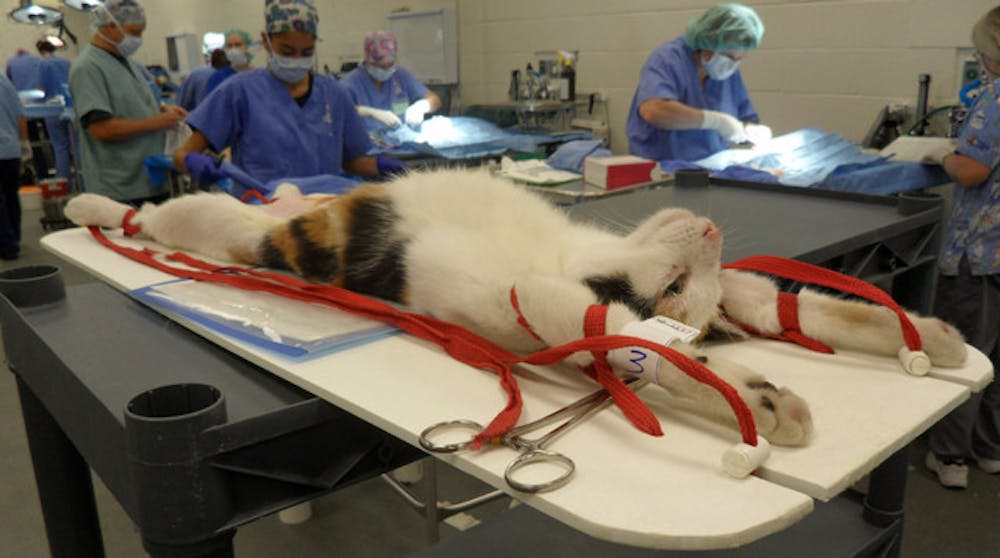Somewhere in Gainesville, Jennifer Kramel knows there is a cat that needs her help.
Kramel arrives at Pointe 23 Apartments in her white Volvo station wagon, searching for a calico cat. She read about it in a Craigslist ad posted by a woman here.
Her headlights shine across a dumpster as she pulls into the parking lot, lighting cat eyes.
A 39-year-old mom and part-time student at Santa Fe College, she has been trapping cats for more than three years. She catches them for Operation Catnip, a nonprofit organization that neuters and vaccinates feral cats in Gainesville, then releases them where they were found.
Kramel parks and walks toward it. She squats and reaches out her hand. The cat hisses, baring teeth, but allows her to pet him. Fingers brush dirty orange fur.
She glances at his left ear. It’s clipped — a sign that he’s already neutered.
She gives him food, and as he dips toward the mushy treat she puts the trap holding the calico, which took the bait, in her car. Looking at the orange cat, she sighs and gets into her station wagon.
A key twists, a gear shifts and she pulls out of the parking spot. As she passes the cat she slows, staring.
“Oh my God,” she says, leaning against the steering wheel. “I feel terrible for this cat.” She covers her mouth.“That cat shouldn’t have to live that way. It’s not fair.”
She hits the gas and moves on.
Feral cats are everywhere. They live on street corners, in parking lots and by dumpsters. Some find caretakers, but most live alone or in colonies, scrounging for food.
Formed in Raleigh, N.C., in 1997, Operation Catnip expanded to Gainesville in 1998. This nonprofit program provides free spay, neuter and vaccine treatment for feral cats.
The program helps keep feral cat populations from skyrocketing, said founder Dr. Julie Levy.
The program holds one clinic a month and usually treats more than 200 cats each time.
These are 200 cats that won’t have litters of homeless kittens. These are 200 feral cats that won’t be at risk for rabies, distemper, feline leukemia or feline upper respiratory infections.
But without people like Kramel to bring cats to the clinic, many might never receive help.
Kramel grew up with pet cats, and feels like it’s her duty to help.
Some nights, she might trap as few as two cats or as many as 19.
But even when she helps 20 cats, there are always a few she finds that are beyond her help. Like the orange cat at Pointe 23 Apartments. Already neutered, it seemed there was no hope for him.
On the drive to the home of Jeffrey Haviland, who sets out food for feral cats, Kramel can’t shake the memory of the cat waiting by the dumpster. She’s going to check on the traps she set at Haviland’s home. The one she couldn’t trap sticks in her mind.
She pulls her car next to the curb and gets out. Haviland walks over to greet her.
Standing by her car, she tells him about other cats she trapped that day. She also tells him about the one she left behind.
She pauses, looking at him.
Haviland seems to notice the cue, but says nothing.
Kramel smiles and bounces on the soles of her feet. She hugs him.
“It would just be really sad for him to die starving in a parking lot.”
On Sunday morning, Kramel drives to the Operation Catnip clinic and unloads the cats, still in their traps after a night in her garage. Each clinic usually has between 90 and 120 trained volunteers, including veterinarians, UF veterinary students and locals.
The orange cat is carried past the anesthesia line and into the clinic’s main room.
On a table, a volunteer covers an unconscious cat with a blue sheet. She cuts the cloth around its pelvis and the surgery begins.
As that cat is sterilized, the orange one is vaccinated. He receives two shots through the trap’s grating. Afterward, he is carried past the other cat, still lying on the table where it will be sewn up and carried to another station.
Getting vaccinated takes about 15 minutes, but the full process takes about an hour. Those who brought cats to the clinic will keep them overnight and then return them to their original haunts. Few cats have surgery complications, and those that do are kept at the clinic overnight.
The orange cat skips this wait and is carried back to Kramel.
Later that day, Kramel takes the orange cat to Haviland’s house. They keep him in the trap for a couple hours, then open it.
Feral cats usually aren’t relocated after Operation Catnip. But for Kramel, the orange cat was an exception. Dirty, worn and hungry, he seemed to be a wanderer.
Kramel believes he will stay.
“He has got it made,” she said. “He’s a lucky cat.”






